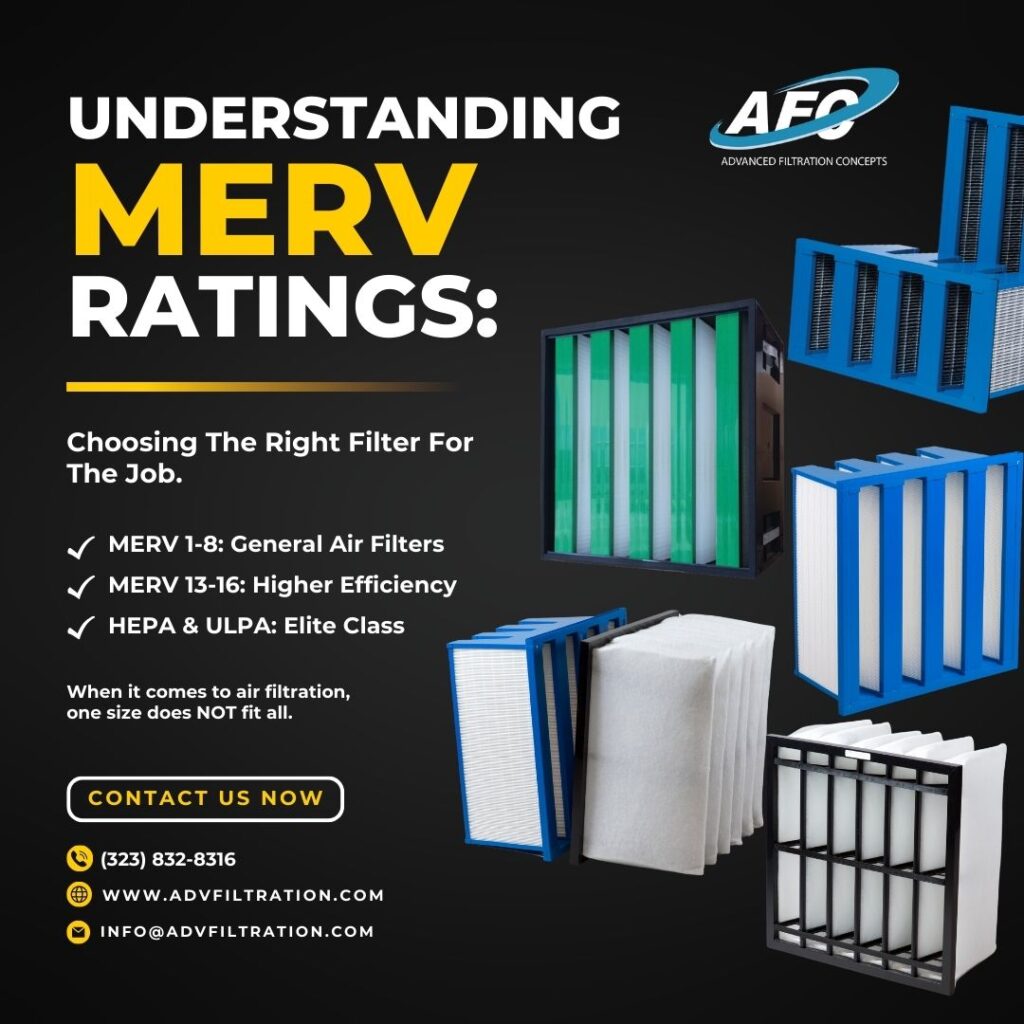When it comes to maintaining optimal indoor air quality, the efficiency of your air filtration system is critical. A key factor in selecting the right air filter is its Minimum Efficiency Reporting Value, or MERV rating. But what exactly does this rating mean, and how can it help you choose the best filter for your specific application? Let’s break it down.
What Are MERV Ratings?
MERV ratings measure an air filter’s ability to capture particles of varying sizes. The scale ranges from 1 to 20, with higher ratings indicating greater filtration efficiency. Choosing the correct MERV rating ensures that your air filtration system operates efficiently, balancing air quality improvement with energy usage and airflow.
MERV Ratings and Their Applications
Here’s a detailed guide to MERV ratings and their ideal applications:
✅ MERV 1-4: Basic Filtration
These filters are commonly used in residential HVAC systems for standard dust and debris control. They are ideal for:
- Capturing large particles like dust, lint, and pollen.
- Homes with low air quality demands.
✅ MERV 5-8: Standard Commercial Use
Filters in this range are designed for general commercial applications. They strike a balance between performance and cost. Applications include:
- Office buildings and retail spaces.
- Removing mold spores, pollen, and dust mites.
✅ MERV 9-12: Enhanced Air Quality
For environments where improved air quality is essential, MERV 9-12 filters are the go-to option. These filters are effective for:
- Schools and hospitals.
- Industrial workplaces, capturing fine particles like lead dust and small allergens.
✅ MERV 13-16: High-Efficiency Filtration
Filters in this range are ideal for facilities that require near-pristine air. Their ability to capture fine particles like bacteria and some viruses makes them suitable for:
- Healthcare facilities and surgical centers.
- Clean rooms and environments exposed to smoke and harmful airborne contaminants.
✅ MERV 17-20: HEPA and ULPA Filters
At the top of the scale, HEPA (High-Efficiency Particulate Air) and ULPA (Ultra-Low Penetration Air) filters provide the highest level of filtration. These filters are crucial for:
- Pharmaceutical production and semiconductor manufacturing.
- Biohazard facilities and environments requiring extreme air purity.
Why the Right Filter Matters
Selecting a filter with an appropriate MERV rating isn’t just about achieving clean air—it’s about maintaining energy efficiency and system performance. Using a filter with a higher MERV rating than necessary may impede airflow and strain your HVAC system, leading to higher energy costs. Conversely, a filter with a rating too low won’t effectively protect against airborne pollutants in more demanding environments.
Advanced Filtration Concepts: Your Partner in Clean Air
At Advanced Filtration Concepts, we understand that every facility has unique air filtration needs. That’s why we offer a wide range of filters, including:
- Pleated filters for general applications.
- High-efficiency HEPA systems for the most demanding environments.
- Custom solutions, such as activated carbon filters for odor and gas removal.
Whether you’re managing a commercial space, healthcare facility, or industrial site, we have the expertise to help you choose the perfect filter for your application.
Ready to Optimize Your Air Filtration System?
Don’t leave your air quality to chance. Contact Advanced Filtration Concepts today to learn how we can help you create a cleaner, healthier environment.
By understanding MERV ratings and selecting the right filter, you’ll ensure optimal air quality, energy efficiency, and system longevity for your space.

